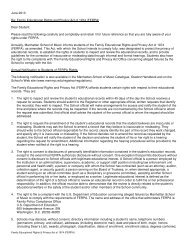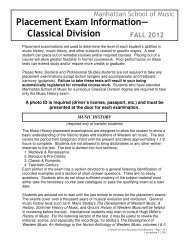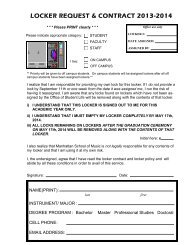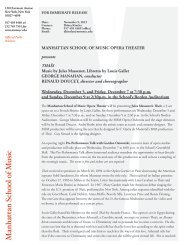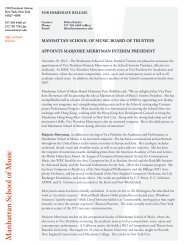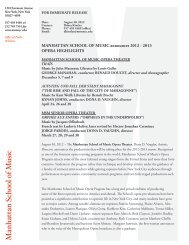Saying Goodbye - Manhattan School of Music
Saying Goodbye - Manhattan School of Music
Saying Goodbye - Manhattan School of Music
Create successful ePaper yourself
Turn your PDF publications into a flip-book with our unique Google optimized e-Paper software.
SAYING GOODBYE:<br />
LEAVING HOME FOR COLLEGE<br />
From the Offices <strong>of</strong> Student & Residence Life<br />
The Offices <strong>of</strong> Student & Residence Life is here to support you during your<br />
transition to college life. There are many things waiting for you here that will be exciting<br />
and pleasurable, others that will be a challenge and an adjustment. You can make your<br />
transition smoother by taking the time to say goodbye to those people in your life who<br />
have helped to get you to where you are today (and allowing them the opportunity to say<br />
goodbye to you).<br />
A goodbye is really an acknowledgment <strong>of</strong> the significance <strong>of</strong> the people in your<br />
life, and a reflection on the loss <strong>of</strong> separation that is approaching. <strong>Saying</strong> goodbye allows<br />
us to reflect on all that was positive about the phases <strong>of</strong> our lives that are coming to an<br />
end. The process <strong>of</strong> saying goodbye allows us to evaluate all that we have and all that we<br />
are in the present, and allows us to enter new experiences with clear ideas <strong>of</strong> what is<br />
important to us. Learning to master changing environments and changing human<br />
relationships is important - change is constantly with us.<br />
How should you say goodbye?<br />
While each individual must develop their own style, the following five strategies are<br />
helpful to most people:<br />
1. Make it a gradual process. Take the time to think about the changes that you are<br />
making in your life. Decide who has been important in your current life phase and plan<br />
ways to celebrate your connection to them over the next weeks.<br />
2. Think about the activities that have been fulfilling for you. What is important to<br />
you? What can you take with you? What will have to be left behind? How can you<br />
celebrate these activities?<br />
3. Communicate with those around you. Talk to family members and friends about<br />
how leaving home (or other communities) feels to you. Let important people know how<br />
much they mean to you and how they will be missed. Discuss ways in which you will<br />
reunite in the future over school breaks using telephone, main, Facebook, or Skype.<br />
4. Take time to appreciate what you have and what is ahead. Look through<br />
yearbooks and photographs. Talk about old times. Realize how much you've grown in<br />
your current environment. Read materials from <strong>Manhattan</strong> <strong>School</strong> <strong>of</strong> <strong>Music</strong> to remind<br />
yourself <strong>of</strong> exciting things to come. Read the New York Times or a New York City<br />
guidebook and think about the opportunities which lie ahead.
5. Define areas <strong>of</strong> continuity in your life. Although your relationships with the people<br />
in your life may be changing, they are not necessarily ending. With whom will you stay<br />
in touch? How? What things about you are unlikely to change? Chances are, if you are<br />
funny, or self-reflective, or athletic or charming in your current environment, you will be<br />
all <strong>of</strong> those things here as well as your musical ambitions with you to college. There are<br />
many activities that you do in your current environment that you will be able to enjoy in<br />
New York.<br />
What should you avoid when saying goodbye?<br />
1. Do not deny the losses that you will face when you make your transition to college.<br />
Although you can keep busy enough not to think about these things, thinking only about<br />
what is to come, and not paying attention to where you are coming from, will only make<br />
the sense <strong>of</strong> loss greater. You may have to deal with the losses <strong>of</strong> the old environment<br />
and the challenges <strong>of</strong> the new all at once!<br />
2. Do not wear rose colored glasses. If you overly glorify the environment you are<br />
leaving, the new one is unlikely to measure up. No matter how good your experiences are<br />
to date, nothing is perfect!<br />
3. Do not be overly critical <strong>of</strong> your current environment, activities and relationships.<br />
This approach does not give enough credit to what you have experienced in your life. It<br />
does not allow you to enjoy and hold on to all that has come before MSM. This also<br />
creates the opposite risk <strong>of</strong> over-glorifying - it puts pressure on life at MSM to be the<br />
answer to all past frustrations.<br />
4. Do not detach yourself too abruptly from your current life. If you do not take the<br />
time to reflect and celebrate, you deny yourself an opportunity to create closure. In the<br />
end, this does not really protect you from loss, and it may leave others feeling hurt.<br />
We at MSM are very much looking forward to saying, "Hello." But first, we hope you<br />
will take the time to say, "<strong>Goodbye</strong>."<br />
(Adapted from work by Dr. Craig Vickio <strong>of</strong> Bowling Green State University)






